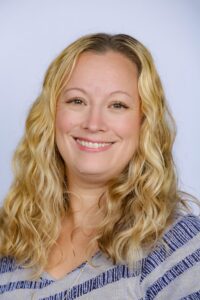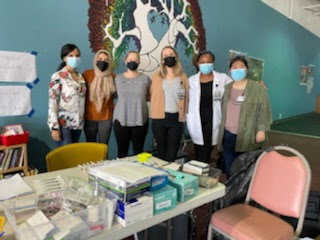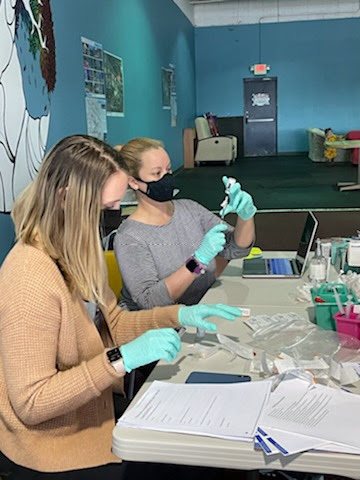Abrons is being recognized for global leadership in medication management for underserved populations
By Katie Ginder-Vogel
While in Dominica, West Indies, for her wedding, Jeanine Abrons (MS ’07) got sick. She wasn’t prepared for the difficult hiking conditions and challenging terrain, and she ended up dehydrated and experienced motion sickness. The staff at their eco-resort climbed the paths and stairs to her cabin to offer traditional healing methods, such as ginger tea, which piqued her interest in integrative health and medicine.

“I was struck by their generosity, kindness, and approaches to health,” says Abrons, a graduate of the University of Wisconsin–Madison School of Pharmacy’s Health Services Research in Pharmacy program (then called Social and Administrative Sciences in Pharmacy).
Afterward, Abrons made connections with local health professionals, and Sam Raphael, social entrepreneur and founder of the Jungle Bay Community Fund, reached out to ask for medical supply donations as part of their philanthropy and social entrepreneurship work.
“That sparked continuing conversations,” says Abrons, who is a clinical associate professor and the director of International Student Pharmacist Activities at the University of Iowa College of Pharmacy.
Now more than 10 years later, Abrons’ primary global practice site works to collaborate with six villages through clinics operated by the Ministry of Health in Dominica, with a focus on education. She travels there once or twice a year, bringing with her a group of student pharmacists for an experiential rotation that she helped establish to provide care, educational resources, and outreach to rural health clinics, schools, and organizations. However, collaborations continue throughout the year, such as project development, grant writing, consulting, and delivering continuing education programs.
She is also the co-director of the University of Iowa Mobile Clinic, which travels to various communities in the Iowa City area to deliver basic health services, screenings, and vaccinations in non-traditional settings, and currently sits on the editorial boards for Currents in Pharmacy Teaching and Learning as well as the Journal of the American Pharmacists Association, where she also served as an associate editor for seven years.
“In the process of doing your work, sometimes you forget that it is unique.”
—Jeanine Abrons
For Abrons’ continued and global efforts to reach underserved populations and improve medication access and management, Abrons is being honored by the American Pharmacists Association (APhA) Foundation with a 2021 Pinnacle Award for Career Achievement.
“I still cannot believe I won the award,” she says. “In the process of doing your work, sometimes you forget that it is unique. You hope that you are making an impact, but sometimes in the day to day, we don’t get to stop and look back. This has been an amazing way to do just that, and it reminds me of what phenomenal partners I have and how grateful I am for their friendships and trust.”
Reaching underserved populations
At the University of Iowa, Abrons’ clinical pharmacy practice and research are focused on global health and underserved populations. One vehicle for training her student pharmacists to do the same is the University of Iowa Mobile Clinic. As co-director, Abrons has helped expand the clinic from five to 14 sites and says it’s one of the initiatives of which she is most proud.

“It’s an inter-collaborative effort among students and health professionals,” she says. “It serves as a valuable teaching tool for students interested in the medical profession to work as part of a team.”
The mobile clinic operates in partnership with community organizations, including local food pantries, and had provided regular HPV and flu vaccines before 2020. When the mobile clinic had the opportunity to add COVID-19 vaccines to their repertoire, facilitated by Abrons, they went from providing 250 vaccines a year to administering over 1,500.
“Having the opportunity to work so closely with community partners and talk about their needs and concerns was really meaningful to me,” says Abrons, who found herself developing strong connections with the patients who came to be vaccinated.
“When you’re providing care for patients, it’s important to get to know them as people and build rapport and trust so people can share how they truly feel,” she says.
Abrons’ respect for her patients’ perspectives extends to her approach to medication management.

“In all my work with medications, I think it’s really important to have trust and rapport with the patients you serve,” she says. “To get the full picture — including allopathic medicine, supplements, natural products, or other therapies — I need to know how they stay well, what being well means to them, and what their goals are with their medications and therapies.”
This deep understanding of patients’ goals and therapies, prescription or otherwise, helps Abrons determine how they all fit safely together.
“When I look at medication management, I think about this concept of integrative health,” she says. “I strive to teach students how to help patients disclose everything to impact how well we care for them — to support patients’ health and make sure they’re safe.”
As the editor of APhA’s annual book Peripheral Brain for the Pharmacist since 2016, Abrons has a comprehensive knowledge of different medication therapies, medication management, and empathic communication. The spiral bound, pocket-sized book features individual cards that address these topics and others, like hypertension management. Reference pages include information about antibiotic treatment and naloxone prescribing, as well as herbal supplements and natural medicine.
“My book tries to take a ton of information about medicines and make it easily accessible,” she says.
Mentorship for global health
Through her roles, Abrons is collaborating with members of the American Association of Colleges of Pharmacy (AACP) Global Pharmacy Education Special Interest Group, which focuses on the social determinants of health and social ecological models in an effort to understand the challenges of accessing care and the best ways to engage in collaborative care.
“My colleagues in Dominica have recently worked a lot with me on projects for dual degree PharmD/master of public health students,” says Abrons. Those students often work on longitudinal projects for the Dominica clinic, and then travel there for a rotation in their fourth year, set up by Abrons.

One of the first students she took to Dominica is still involved as a preceptor, and Abrons has developed many close relationships with her collaborators there. Abrons has also worked with providers and students in India and says she values being able to interact with so many different people all over the world.
“Seeing students I’ve mentored progress in their careers and do things that exceed my expectations is awesome,” she says. “I love seeing their different perspectives and having them challenge the way I view the world.”
Back on campus at the University of Iowa, Abrons leverages her international experience in another way: as a Fulbright faculty mentor to students applying for Fulbright scholarships. The Fulbright scholarship is one of the largest educational exchange programs in the world, and faculty mentors help students applying for the fellowship write their personal statements, come up with a specific project idea and identify collaborators, determine how they plan to engage with the community, and explain how they would make their effort culturally relevant.
“It always blows my mind how amazing these proposals people put together are,” Abrons says. “I’ve had a couple of pharmacy students who’ve been able to go and hopefully will continue to engage in global work and collaboration.”
Finding her path
Abrons’ interest in global health was piqued as an undergraduate at Drake University, where the professor of her class on global healthcare systems invited Abrons to collaborate with her on a research project.
“We presented at a national conference, and she introduced me to professors from all over,” recalls Abrons.
Academia appealed to her, so after earning her PharmD from Drake University, Abrons applied to the UW–Madison School of Pharmacy’s Health Services Research in Pharmacy program (then called Social and Administrative Sciences in Pharmacy).
“I remember when I came up to Madison, in the middle of a snowstorm,” Abrons says. Professor Betty Chewning met her at Lombardino’s restaurant and then trekked across in the snow, later meeting Professor Dave Mott at the Nitty Gritty. Abrons was charmed.
“Being able to hear people’s experiences — patients, students, or colleagues — see them as authentic people, and envision yourself doing the things they do is so important.”
—Jeanine Abrons
“I thought, this feels like a family and a community, and Madison is such a cool place to be,” she says. “I felt like I could get clinical skills from practicing, which I did in grad school, and I felt like having a research foundation would launch me into different things.”
Abrons credits the School of Pharmacy with preparing her for her multifaceted career.
“I got to take classes in so many disciplines,” she says. “I learned my research skills, content analysis, surveys, qualitative research skills, and experience with focus groups from UW–Madison. Now, I get to pass those skills on to my students.”
Many of her former professors, or even fellow alumni, from the School of Pharmacy continue to serve as collaborators and mentors, such as emeritus Professor Bonnie Svarstad, who received the Pinnacle Award in 2004. One of Svarstad’s lasting lessons to Abrons is in recognizing people as individuals.
“Being able to hear people’s experiences — patients, students, or colleagues — see them as authentic people, and envision yourself doing the things they do is so important,” she says.